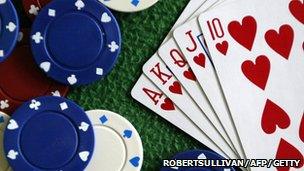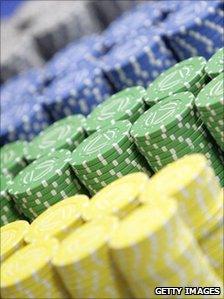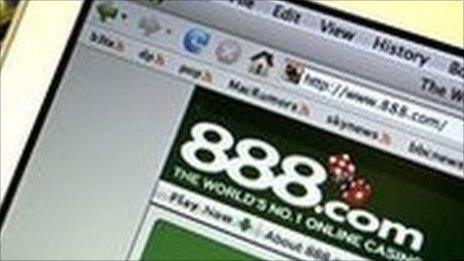Online poker industry in turmoil after US indictments
- Published

Some of the world's most popular online poker sites face criminal charges in America
US authorities have unveiled an indictment against the owners of three of the world's biggest poker websites, throwing the young industry into turmoil.
Criminal and civil charges filed in New York, external have forced online poker sites PokerStars (based in the Isle of Man) and Full Tilt Poker (based in Alderney, in the Channel Islands), as well as Canada-based Absolute Poker, to stop doing business with Americans.
It is the latest upheaval for the industry, which over the last decade has grown from nothing into one that rakes in an estimated $5bn (£3.25bn) each year and is regulated in vastly different ways in countries around the world.
America is the biggest market, with up to a million online players. Gambling laws vary from state to state, but in 2006, the US federal government attempted to put the brakes on online poker with the Unlawful Internet Gambling Enforcement Act, external (UIGEA).
The UIGEA was meant to halt money transfers to online gaming sites, and several big poker sites, wary of running foul of the law, pulled out of the American market. However the three companies named in the indictment continued to welcome US-based customers.
Federal prosecutors in New York are seeking at least $3bn (£1.8bn) in civil money laundering penalties. If convicted, the 11 men named in the indictment face possible prison time and huge fines.
As a result of this latest scandal, the share prices of competing poker sites, which have already turned down business from US players, have experienced a significant jump.
'Elaborate' fraud
Prosecutors accuse the companies and alleged co-conspirators of concocting dozens of fake corporations - purportedly selling items such as clothing, golf clubs and pet food - to collect money from US players.
After American financial institutions got wise to the trick, the indictment alleges, the companies decided to change strategy.
Prosecutors say they managed to persuade several small local banks that were facing financial difficulties to process poker-related transactions, by promising fees and fresh investment cash.
In one case, the indictment says, PokerStars and Full Tilt Poker took a 30% stake in a Utah bank, SunFirst, and used it to process $200m (£123m) in poker funds.
"These defendants concocted an elaborate criminal fraud scheme, alternately tricking some U.S. banks and effectively bribing others to assure the continued flow of billions in illegal gambling profits," Manhattan US attorney Preet Bharara said in a statement.
"Moreover, as we allege, in their zeal to circumvent the gambling laws, the defendants also engaged in massive money laundering and bank fraud."
A court order seized poker company funds in 76 bank accounts in 14 countries. The companies also had their .com domain names seized - the usual images of chips, cards and superstar poker players replaced by blunt legal statements and the FBI logo, external.
On Wednesday, the prosecutors announced that they would be handing back control of the .com domain names to PokerStars and Full Tilt Poker, external so that the companies could refund their US customers.
Negative attention
Aaron Todd, a senior editor for industry news site Casino City Times, said the poker companies were caught off-guard by the indictment despite years of openly challenging the US law.

Some of the world's most popular online poker sites face criminal charges in America
"If you're a big player in an industry as big as poker, with laws in place designed to stop what you're doing, it's not that surprising that the authorities are going after you," Mr Todd said.
He says that estimates suggest a large proportion of players on the British sites actually come from the US - perhaps up to half of all players on the Alderney-based Full Tilt poker site.
Mr Todd says the indictments will hit the incomes of big-name American players who reap endorsement money on top of their poker winnings, but also lesser-known "grinders" - low stakes players who squeeze out smaller profits over time.
"At this point, a lot of players have lost two main places they play.
"There are some sites that are still open for US play, but people will be wary of playing on those sites, as they too could close to American players or face similar legal action."
Last year, 5 live Investigates reported on a ring of Chinese poker players who colluded to rip off players on the Isle of Man-based PokerStars site. PokerStars refunded $2.1m (£1.3m) to customers across the world after the scam was uncovered.
That case was not an isolated one. The company had previously refunded $80,000 (£52,000) to players who unwittingly played against poker "bots" - automatic card-playing software programmes.
And in 2007 Absolute Poker refunded $1.6m (£985,000) after it was alleged that a company insider cheated customers.
'Black Friday'
However, this latest indictment, unsealed last week, could cost the companies far more than cheating scandals ever did.
PokerStars and Full Tilt Poker blocked US customers after the FBI's action on what poker players are calling "Black Friday" on blogs and in online forums.
However, players elsewhere in the world have continued to use the online card rooms after the company websites were moved to .eu domains, outside the reach of American authorities.
An e-mail sent to PokerStars players said: "It is business as usual for all players outside the USA …you can rest assured that player balances are safe."
In a statement released after the indictments were unsealed, Full Tilt said it was "saddened" by the charges.
The company added: "Full Tilt Poker believe online poker is legal and has always has been committed to preserving the integrity of the game and abiding by the law."
Absolute Poker did not respond to the BBC's inquiries.
Aaron Todd of Casino City Times says the indictments could potentially lead to more political pressure to relax online gambling laws in America.
"This is a huge deal and it has absolutely shifted the landscape of online poker forever."
Listen to 5 live Investigates on BBC Radio 5 live on Sundays from 2100 BST. You can also listen via the BBC iPlayer or download the 5 live Investigates podcast.
You can also post comments on Facebook , externaland send comments via Twitter, external. Or use the form below to contact the team.
- Published18 April 2011

- Published15 April 2011
- Published25 March 2011